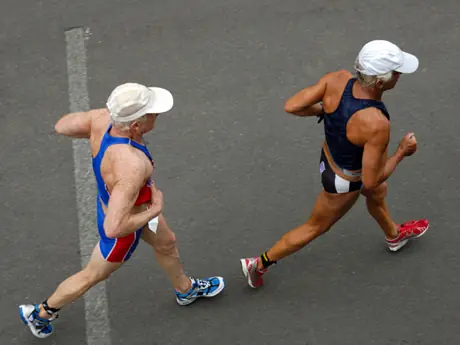To illustrate this point, consider a personal anecdote from my days as a collegiate runner.
Training Weight Versus Racing Weight
I was fortunate to run at the University of Colorado, where I was part of a fantastic running culture. My common training regimen would put me at roughly 85 miles a week in single runs: 20 miles on Sunday, 12 or so on Tuesday and Friday, a medium-distance run of 13, 14 or 15 on Wednesday and easy days of roughly 10 miles (many teammates ran twice a day, which took their weekly totals to well over 100 miles a week). I had several teammates who trained at the same volume I did. What baffles me to this day is that while a teammate and I watched our diets and struggled to be as lean as possible, there were others who were extremely lean even though they always had seconds and would often have several bowls of ice cream at night.
I bring this up to highlight the individuality of metabolic rate. We all have a different basal metabolic rate. While that rate does increase when you're training seriously, your rate may differ from a fellow runner who is training at the same level. For serious runners, there is often a difference between your training and racing weights.
Your training weight is the weight you want to maintain roughly 90 percent of the year. Why? Because if you try to weigh less, you'll often find that you'll get sick more often and fail to have as much consistency in your hard workouts.
A couple times a year, it's realistic to focus on your weight and trim down so you're lighter when you toe the starting line. But, finding a safe race weight is a challenge for most runners, and my suggestion is simple: Don't be greedy. A pound or two for a marathoner is important, and this goal is realistic for most if they watch their diets in the last four weeks of training.
More: 4 Weight-Loss Barriers Holding You Back
If you weigh yourself daily when whittling down to your race weight, remember:
- If you've had a salty meal, you could weigh a pound or two more than normal due to water retention. As a runner, you should hydrate throughout the day, but your retention of that water will vary based on salt intake.
- A great time to weigh yourself is first thing in the morning when you get out of bed. That way you don't have as many variables such as food and water altering the number upwards or, conversely, seeing a lower number on the scale that you could easily get by weighing yourself after a run (especially a run in heat and/or humidity).
Please, please be honest with yourself about where training weight, and potentially, race weight fit into your love of running. Most runners have enough to worry about between their jobs, families, getting in long runs and all of the ancillary work that goes into intelligent training. For most runners, it's difficult to add another element to the mix such as a focused, clean diet that is rich in fruits and vegetables, has smart fats and quality protein (as well as good recovery food and drink after long runs and workouts).
More: Your Guide to Dieting and Weight Loss
Here's another way to look at this issue of weight loss: If you stay injury-free, then you'll likely be leaner come race day for the simple fact that you didn't have to miss calorie burning training days.
When it comes to weight loss for runners, there are no clear-cut answers. Be kind to yourself if you attempt to trim down to a safe, reasonable race weight that you'll use a couple of times a year.
More: Reach Your Racing Weight the Right Way
 Sign up for your next race.
Sign up for your next race.- 2
- of
- 2
About the Author

Get ACTIVE on the Go


Couch to 5K®
The best way to get new runners off the couch and across the finish line of their first 5K.
Available for iOS | Android







Discuss This Article